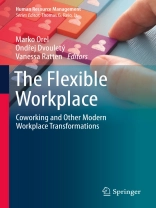With current socio-economic development trends and changing work landscapes, modern workplaces are progressively becoming a subject of flexibilisation and hybridisation. Contemporary office environments are commonly adapting to the needs of the flexible labour markets by offering the non-territorial and rotation-based practice of allocating desks to workers on dynamic schedules. This book explores this growing trend by offering different perspectives on the benefits and challenges of the flexible workplace phenomena. Topics discussed range from defining and comparing flexible, coworking and corpoworking spaces, policies made in local environments, and the flexible working taxonomy.
Cuprins
1. Beyond coworking: from flexible to hybrid spaces.- 2. The coworking phenomenon – an organisational revolution or a continuous evolution?.- 3. Coworking Spaces for Public Administration.- 4. The evolution of coworking spaces in Milan and Prague: spatial patterns, diffusion and urban change.- 5. Corporate Coworking – A Catalyst for Collaboration, Creativity and Innovation.- 6. Coworking vs corpoworking: a realistic perspective.- 7. Coworking Spaces in Small Cities and Rural Areas. A Qualitative Study from an Operator and User Perspective.- 8. Coworking’s Cooperation Paradox. On the Role of Stigmergic Curation.- 9. Mediation matters: the role of staff in coworking constitution.- 10. Experiencing collaborative spaces: Evidence from social media.- 11. The Emergence of the Digital Nomad. A Review and Analysis of the Opportunities and Risks of Digital Nomadism.- 12. Workations and their impact on the local area in Japan.- 13. Digital Nomadism as a New Flexible Working Approach: Making Tirana the Next European Hotspot for Digital Nomads
Despre autor
Marko Orel is an Assistant Professor who operates in the field of socioeconomics, particularly focusing on evolution of work and related challenges of workplace transformation. He is exploring project and operational networks of influences, community engagement moderation and its inter-relational participation in collaborative work processes. He heads the Centre of Workplace Research in Prague, Czech Republic and regularly engages in scholarly debates on future of workspace.
Ondřej Dvouletý is an Associate Professor at the Department of Entrepreneurship at the University of Economics in Prague (Czech Republic). Ondřej´s research is dedicated to the investigation of entrepreneurial activity, effects of public entrepreneurship and self-employment policies and entrepreneurial economics.
Vanessa Ratten is an Associate Professor of Entrepreneurship and Innovation at the Department of Management, Sport and Tourism, La Trobe Business School at La Trobe University, Melbourne, Australia. She teaches Entrepreneurial Business Planning, Managing Innovation in Organisations and Entrepreneurship.












